As Canada formally acceded to the United Nations Arms Trade Treaty (ATT) Tuesday, a coalition of Canadian civil society groups is calling on the federal government to cancel its multibillion contract to supply Saudi Arabia with advanced armoured vehicles.
The coalition, which includes Amnesty International, Oxfam Quebec and peace group Project Ploughshares among others, calls on Ottawa to “honour the spirit and intent of the ATT” by ending the export of Canadian-manufactured Light Armoured Vehicles (LAVs) to the oil-rich kingdom.
In addition, former Bloc Quebecois MP and University of Montreal law professor Daniel Turp is threatening legal action if Ottawa continues to sell weapons to Riyadh.
“This morning I sent a formal notice to the minister of foreign affairs [Chrystia Freeland] asking her to annul the export permits that have already been issued and that would allow the export of these LAVs that continue to be produced in London by General Dynamics Land Systems – Canada,” Turp told Radio Canada International in a phone interview.
“And I have mentioned in that formal notice that if on Sept. 30 there is no positive answer, I will bring a case and ask courts to order the government to annul these export permits.”
Global Affairs Canada spokesperson John Babcock said by acceding to the ATT Canada has taken “firm action” to strengthen its export controls system.
“As we have said before, we are reviewing export permits to Saudi Arabia and no final decision has been made,” Babcock said in an emailed statement to Radio Canada International. “While this review is on-going, no new permits have been issued.”
Evidence of war crimes in Yemen
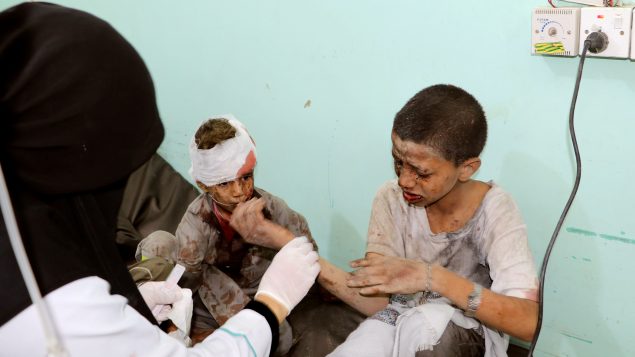
A doctor treats children injured by an airstrike by the Saudi-led coalition in Saada, Yemen August 9, 2018. (Naif Rahma/REUTERS)
The Liberal government approved the controversial $15-billion deal, signed by the previous Conservative government, to supply the Islamic Kingdom with hundreds of LAV 6.0 advanced combat vehicles in 2016.
According to Global Affairs Canada statistics, Saudi Arabia was the largest non-U.S. export destination in 2018, receiving approximately $1.2 billion in Canadian military exports.
That accounts for nearly 62 per cent of the total value of non-U.S. military exports by Canadian defence companies, according to the annual Report on Exports of Military Goods from Canada published by Global Affairs.
In a statement released Tuesday, the coalition said there are credible reports that Canadian military equipment – including LAVs produced in Ontario – has been used by Saudi Arabia in Yemen.
The conflict between the Saudi-led coalition, which props up the Western-backed government of Yemen, and Iran-backed Houthi rebels, who control most of the country, has killed more than 6,700 civilians and injured over 10,700 others.
- Canada won’t scrap LAV deal over Saudi journalist’s disappearance, says Freeland
- Canada plans to toughen arms-export rules but will honour Saudi arms deal: Freeland
While all sides of the conflict have been accused of committing war crimes and other serious violations of international humanitarian law, the majority of civilian casualties have resulted from airstrikes carried out by the Saudi-led coalition, according to the Office of the United Nations High Commissioner for Human Rights (OHCHR).
Hundreds of thousands of Yemenis have been displaced by the fighting and millions suffer from shortages of food and medical care amid the world’s largest cholera epidemic ravaging the country.
“Air strikes, indiscriminate shelling, acts of torture and sexual violence are only some of the many violations suffered by Yemen’s civilian population on a daily basis,” said the statement by the coalition of Canadian civil society and human rights groups.
“In light of these alarming findings, Canada must act rapidly to avoid fuelling, in any way whatsoever, this devastating conflict and prolonging the suffering of the Yemeni people.”
States funnelling arms to the parties to the conflict may be held accountable for their role in aiding or abetting the commission of human rights violations, the statement added.
‘Inconsistent with Canada’a legal obligations’
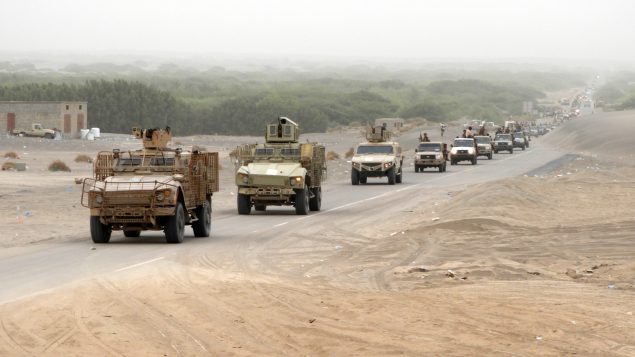
A column of Yemeni pro-government forces and armoured vehicles arrives in al-Durayhimi district, about nine kilometres south of Hodeidah international airport on June 13, 2018. (Nabil Hassan/AFP/Getty Images)
Justin Mohammed, a spokesperson for Amnesty International Canada, said continued arms sales to Saudi Arabia are inconsistent with Canada’s legal obligations under the ATT because there are reasons to believe that they could be used to commit serious human rights and international humanitarian law violations.
“The spirit and the letter of the ATT make it incumbent upon the Government of Canada to fully examine the risks that Canadian arms exports could be used to commit serious violations of international human rights or international humanitarian law,” Mohammed said. “In light of the conflict in Yemen, the Saudi LAV deal is an obvious place to start.”
- EXCLUSIVE: Leaked UN report piles pressure on Ottawa’s Saudi arms deal
- Canada to proceed with multi-billion arms sale to Saudi Arabia
The treaty came into force in December 2014 and seeks to regulate the sale of conventional arms – anything from small arms to tanks, fighter jets and warships – to minimize the humanitarian impact of the global arms trade.
According to the UN, 130 countries – with the notable exceptions of Russia and China, the world’s number two and number three top arms exporters – have signed the treaty and 104 have already ratified it. The U.S., the world’s biggest arms exporter, has signed the treaty but has notified the UN that it has no intention of ratifying it.
The Liberal government announced that it plans to accede to the ATT in 2016, after the previous Conservative government refused to put Canada’s signature on the international treaty when it was first introduced in 2013. In 2017, the Liberals tabled legislation to amend the Export and Import Permits Act (EIPA) to establish controls on brokering of military items and to incorporate directly into Canadian law the assessment criteria laid out in the ATT.
Bill C-47 received Royal Assent on Dec. 13, 2018 and came into force on Sept. 1, 2019.
New assessment criteria
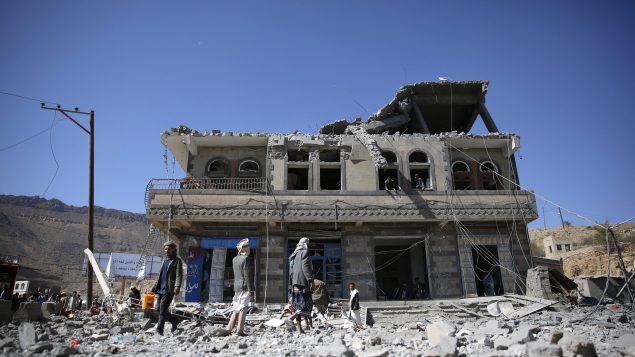
People gather at the site of a house damaged by Saudi-led airstrikes in Sanaa, Yemen, Monday, Jan. 4, 2016. According to U.N. figures, the war in Yemen has killed at least 6,872 people since March 2015, when fighting escalated after the Saudi-led coalition began launching airstrikes targeting the Houthi rebels. (AP Photo/Hani Mohammed)
Milos Barutciski and Josh Scheinert, lawyers with Canadian law firm Borden Ladner Gervais LLP, said the law now requires the minister of foreign affairs to assess all proposed arms export or brokering permits against criteria related to international peace and security and human rights.
The new criteria require the minister to assess if the export of arms or defence technology would undermine peace and security, or could be used to commit or facilitate serious violation of international humanitarian or human rights law, breach international conventions or protocols on terrorism or organized crime to which Canada is a party, or be used against women and children.
- Canada’s arms trade dilemma
- EXCLUSIVE: Canadian defence deal with Azerbaijan raises new questions about arms export controls
“The Minister cannot issue an export or brokering permit if there is a ‘substantial risk’ that exporting or brokering the goods or technology would result in any of the negative consequences listed above,” Barutciski and Scheiner said in a written analysis of these legislative and regulatory changes.
New legal basis for court challenge
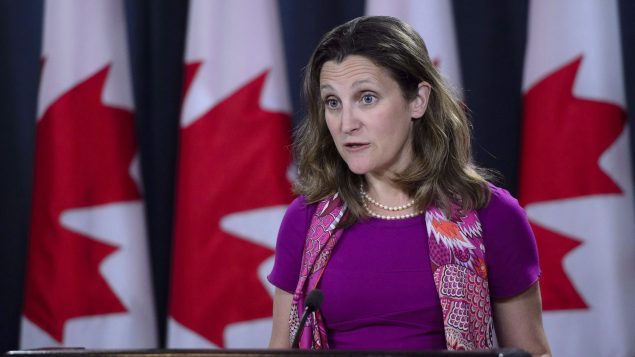
Foreign Affairs Minister Chrystia Freeland makes an announcement at the National Press Theatre in Ottawa on Wednesday, May 23, 2018. (Sean Kilpatrick/THE CANADIAN PRESS)
Turp said Canada’s accession to the ATT creates a new legal basis for his court challenge of the LAV sale to Saudi Arabia.
Turp’s previous attempts to have the Federal Court stop the export of LAVs were unsuccessful.
“What’s interesting now is that there is a treaty and there is also implementing legislation of that treaty,” Turp said. “And the rules have changed because the discretion that the minister had before under Canadian law, which the court acknowledged, doesn’t exist anymore.”
Turp said there is a good chance that the Federal Court will follow the example of courts in the U.K. and Belgium and suspend the export permits.
While for now he is focusing on the LAV deal, it’s possible that legal action can be taken against other Canadian arms exports to Saudi Arabia and to other countries, such as the United Arab Emirates, which despite its recent decision to scale back its military presence in Yemen, has also been heavily involved in the conflict, Turp said.
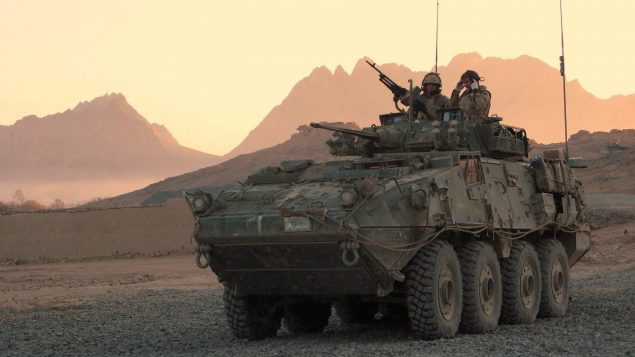






For reasons beyond our control, and for an undetermined period of time, our comment section is now closed. However, our social networks remain open to your contributions.